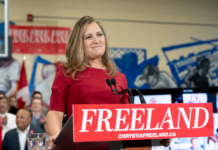Canadians can expect higher prices for new and used gasoline cars if Ottawa follows through in punishing auto traders who don’t abide by their arbitrary EV sales quotas.
In a recent statement, the New Car Dealers Association of BC has voiced significant concerns regarding the Canadian government’s ambitious electric vehicle sales quotas, suggesting these mandates could inadvertently cause dealers to shed inventory and drive up prices.
The statement comes in response to findings from an AutoTrader survey indicating a decrease in Canadian interest in EVs.
Blair Qualey, President and CEO of the association, has criticized the federal government’s strategy to enforce mandatory EV sales.
Qualey highlights the economic implications of these mandates, which include a substantial penalty of $20,000 per non-compliant vehicle, which he believes will compel manufacturers to decrease the availability of gasoline models.
“Consumers make decisions when it makes economic sense, not because of hard and arbitrary targets – so we need to continue to drive demand with incentives and providing needed charging infrastructure,” wrote Qualey.
“Furthermore, forcing a sales target that will penalize auto manufacturers, with a $20,000 charge per vehicle sold outside the arbitrary mandate, for not hitting a target means they will simply reduce availability of certain gas models to meet the quota and avoid penalties, which will restrict supply and drive up the price for both new and used.”
Recent data from AutoTrader showed a noticeable decline in Canadian interest in electric vehicle ownership. The survey revealed that while nearly half of non-EV owners are considering an EV for their next purchase, enthusiasm has waned from 68% in 2022 to 56% in 2023.
Tiffany Ding, director of insights and intelligence at AutoTrader, elaborated on the findings, indicating that barriers such as higher purchase costs, concerns over long-distance travel capabilities, and a lack of adequate charging facilities are deterring potential buyers.
With the Liberal government’s plan to mandate 100% EV sales by 2035, starting with a 26% quota for zero-emission light-duty vehicles by 2026, the industry faces significant challenges. The target will be phased in gradually over the years with a 26% goal by 2025 and 90% goal by 2030.
Other challenges recently highlighted by the Automotive Industries Association of Canada include a lack of specialized and standardized training for EV technicians. According to the group, there are simply not enough trained specialists available in Canada to repair and maintain a 100% EV target.





















